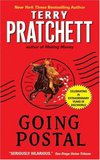
At the time of writing this, Going Postal is tied for the second highest rated Discworld book on Goodreads (tied with Men at Arms at 4.37, behind Night Watch at 4.48). There’s a reason for this…
Essentially, Going Postal takes a small pile of topics–technical innovation and traditional technology versus the new hotness; conmen and businessmen; the postal service itself–and squishes them together with the wonderful latter book Discworld flair Pratchett is so known for.
It’s done wonderfully, and it’s fascinating to see the parallels with the modern world, particularly in the tech industry (although that might be an artifact of what I’m familiar with, I’m sure all industries are similar). As always, the Discworld really makes one think about our own world…
But, in truth, it had not exactly been gold, or even the promise of gold, but more like the fantasy of gold, the fairy dream that the gold is there, at the end of the rainbow, and will continue to be there forever - provided, naturally, that you don’t go and look. This is known as finance.
Characterwise, a lot of the strength of the book rests on ex-ish-conman Moist Van Lipwig who–upon being sentenced to death by hanging–is given a second lease on life by Lord Vetinari. He’s going to the Postmaster. Given that the post office hasn’t actually been delivering mail for decades now–despite collecting it–and that most of the burden of long range communication has been taken over by the Clacks (the telegraph, essentially), it’s an interesting job. Who better to solve the problem though, than one who seems to embody the very nature of the saying ‘fake it until you make it’?
On top of that, you get bits with Vetinari–always fun to see what he’s up to –and a number of golems–which are among my favorite Discworld races. There are a couple of new characters unique to the post office, including Stanley, collector of pins and–now that they’ve been invented–stamps among many others.
Like I said, there’s a reason this book is rated so highly. On top of that, you really don’t need to have read any of the other Discworld books before this one to understand what’s going on. To some extent, it’s in the Industrial Revolution subseries, but other than new technology, nothing has really changed.
Well worth the read.